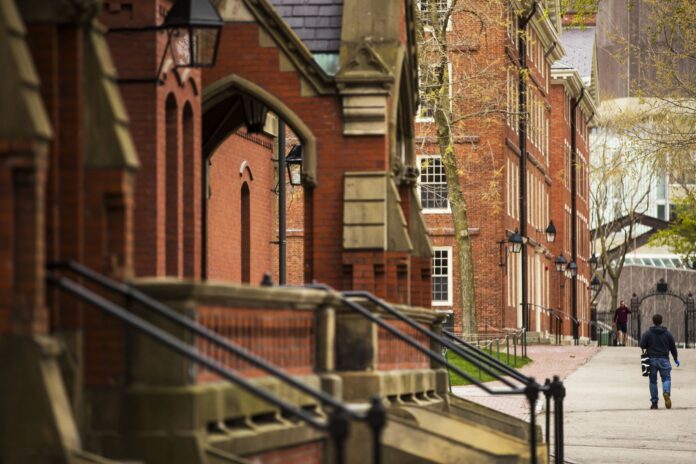
New York (CNN) — Harvard University submitted a trove of documents on Friday to House lawmakers investigating the plagiarism scandal surrounding former President Claudine Gay.
The documents represent the most detailed glimpse yet into Harvard’s review of the plagiarism allegations surrounding Gay, who stepped down earlier this month amid a firestorm of controversy.
Nick Barley, a spokesperson for the House Education and Workforce Committee, told CNN that lawmakers are “currently reviewing” documents related to the plagiarism investigation Harvard sent ahead of a 5 pm ET deadline.
An eight-page document submitted by Harvard provides new information about the Ivy League school’s response to the controversy, including a more detailed chronology of the review.
In that document, Harvard for the first time named the four members of a Harvard Corporation subcommittee formed to weigh the charges against Gay: Mariano-Florentino (Tino) Cuellar, former justice of the Supreme Court of California; former Amherst College President Biddy Martin; former Princeton University President Shirley Tilghman; and Theodore Wells, Jr, partner at the law firm Paul, Weiss.
Notably, Tilghman, the former Princeton president, was also on the independent committee that reviewed the scientific work of then-Stanford president Marc Tessier-Lavigne. He stepped down in July after the review found significant flaws in his research.
That document is among those provided to the House committee on Friday, a Harvard spokesperson told CNN.
Other documents included in Harvard’s submission to Congress are “responsive” to the committee’s detailed request, the university spokesperson said.
Chronology of a scandal
As previously known, Harvard told Congress that its review of Gay’s writings began on Oct. 24 when a New York Post reporter contacted the university’s public affairs team about allegations of plagiarism.
“The university promptly began to assess the allegations and, through counsel, requested additional time from the Post’s legal counsel to review these allegations,” Harvard said in the documents.
Five days, the Harvard Corporation unanimously voted in a session that excluded Gay to initiate a review.
“Additionally, that same day, then-President Gay requested an independent review,” the Harvard document states.
Previously, Harvard’s timeline mentioned only that the Corporation launched the review at Gay’s request.
As was previously disclosed, in early November the Harvard subcommittee appointed an independent panel of three political scientists to conduct the outside review. Harvard did not name those experts in the eight-page House response posted on its website.
However, the university provided new details on who they are, saying they are tenured faculty members at “prominent research institutions across the country,” fellows of the American Academy of Arts and Sciences, and two are former presidents of the American Political Science Association.
“At their request, consistent with the norms of a confidential peer review process, Harvard agreed not to keep the identity of the panelists confidential,” Harvard told the House. “The panelists continue to request that Harvard not release their names.”
Ultimately, the Harvard Corporation “required” Gay to issue corrections, “a significant repercussion for a scholar in academia,” the university told lawmakers.
However, Harvard officials announced last month they had determined Gay’s conduct did not constitute research misconduct as defined by university policy.
But new charges about Gay’s writings continued to spill out – specifically about her 1997 PhD dissertation.
Harvard told House lawmakers that the university first found out about allegations around Gay’s dissertation via social media on December 10. The dissertation was not part of Harvard’s initial review.
The Harvard subcommittee “promptly reviewed” Gay’s dissertation, according to the university, and found “examples of duplicative language without appropriate attribution.”
Last month, Rep. Virginia Foxx, the Republican chair of the committee, wrote a letter to Penny Pritzker, the senior fellow of the powerful Harvard Corporation, the university’s top governing board, demanding information on Harvard’s response to “credible allegations of plagiarism” by Gay over a 24-year period.
A short presidency
Gay on January 2 ended the shortest presidency in Harvard’s nearly 400-year-history. She was Harvard’s first Black president and second woman to run the university.
The Harvard Crimson previously reported that the university submitted documents to the committee on Friday.
Gay’s short tenure was ultimately undone by criticism of the university’s response to rising antisemitism on campus in the wake of Hamas’ Oct. 7 attacks on Israel – and her disastrous congressional hearing a month ago in which she and other university presidents failed to explicitly say calls for genocide of Jewish people constituted bullying and harassment on campus.
But, following the hearing, Gay began to draw widespread criticism over accusations of plagiarism, including multiple instances of missing quotation marks and citations. Harvard last month announced Gay planned to submit corrections to her 1997 PhD dissertation to correct instances of “inadequate citation,” adding to the ones she issued earlier to a pair of scholarly articles she wrote in the 2000s.
Notably, the university called those corrections “regrettable,” but found they did not meet the punishable threshold of research misconduct.
Gay later apologized for her statements during the hearing. But she defended her academic record in an op-ed published in the New York Times January 3 following her resignation.
“My critics found instances in my academic writings where some material duplicated other scholars’ language, without proper attribution. I believe all scholars deserve full and appropriate credit for their work,” the former Harvard president wrote, adding that she “promptly” requested corrections upon learning of these “errors.”
Gay added that she “proudly” stands by her work and noted she “never misrepresented my research findings, nor have I ever claimed credit for the research of others.”
Experts CNN spoke to have found Gay’s work does include multiple instances of plagiarism. However, they differed over how and whether she should have been punished. And they stressed matters of plagiarism are complex, with academics rarely getting fired for such misconduct.
This story has been updated with additional developments and context.
The-CNN-Wire


